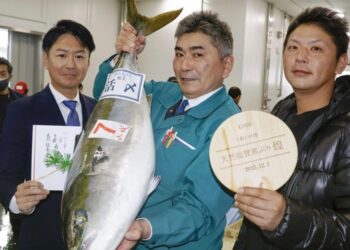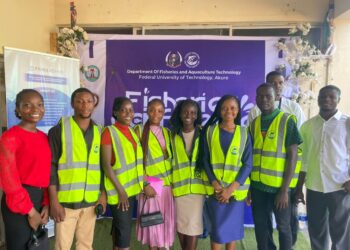CHITELIX Transforming Marine Waste into Sustainable Value through Circular Bioinnovation _ In a world increasingly defined by environmental challenges and urgently seeking sustainable solutions, Kais Aouaieb, Co-Founder and Chief Operating Officer of CHITELIX, stands out as a visionary entrepreneur transforming marine waste into high-value bioproducts. His journey is a testament to how innovation, sustainability, and business growth can coexist to drive both economic and environmental impact.
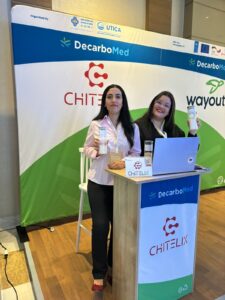
From Finance to Circular Innovation
Kais Aouaieb is an entrepreneur driven by innovation in the circular economy, sustainable business models, and climate-driven solutions. As the Co-Founder and Chief Operating Officer of CHITELIX, he focuses on transforming underutilized marine resources into high-value bioproducts that support a greener and more sustainable future.
Holding a Master’s degree in Management and with over 13 years of experience in banking, international trade, and financial management, Kais has established a strong foundation in business strategy, operational efficiency, and global market dynamics. This background enables him to bridge the gap between finance, sustainability, and entrepreneurship—ensuring that the solutions developed under his leadership are not only innovative but also scalable and economically viable.
Today, as the COO of CHITELIX, Kais uses that expertise to bridge the gap between finance and circular innovation. His focus is on transforming underutilized marine resources—such as blue crab shells—into sustainable, high-value bioproducts that can reshape industries.
“I believe innovation, sustainability, and business growth are not trade-offs but complementary forces,” says Kais. “Our mission at CHITELIX is to align impact-driven science with real-world market solutions that make a measurable difference.”
The Birth of CHITELIX and Turning a Challenge into Opportunities
CHITELIX was born from a friendship and a shared vision to solve one of the seafood industry’s biggest challenges: waste management.
After years of experience in the sector, the founders witnessed firsthand how invasive blue crab shells and other seafood by-products were being discarded as useless waste without generating any added value.
Their initial idea—to turn these materials into fish meal—failed because the shells contained chitin, which made them indigestible. Rather than abandon the idea, the team went back to the lab. What they discovered changed everything: chitin and its derivative, chitosan, had enormous potential in industries from agriculture to healthcare.
They soon discovered that chitin—once viewed as an obstacle—was, in fact, a hidden treasure with extraordinary potential. The true “aha moment” came when they realized that what had long been treated as waste could be transformed into multiple high-value bioproducts. Suddenly, CHITELIX was no longer confined to a single industry but positioned at the gateway to endless possibilities across agriculture, healthcare, water treatment, and more.
“What once seemed like a barrier became our breakthrough,” Kais recalls. “We realized that this waste material could become the foundation for multiple sustainable industries.”
After two years of research and development, CHITELIX evolved from low-value recycling to establishing a circular biorefinery that extracts biopolymers and bio-ingredients from marine waste. Beginning with lab tests in 2022, the team has since built a pilot unit that demonstrates both the economic feasibility and the environmental impact of their innovative solution.
From Lab to Industry
Scaling the process from laboratory experiments to industrial applications was one of the biggest challenges. What worked in small volumes required extensive fine-tuning to function on a larger scale. Beyond the technical hurdles, this was also a completely new activity in Tunisia, which meant the team had to navigate multiple administrative and regulatory obstacles along the way. Fortunately, many officials across different ministries and agencies believed in the company’s vision and offered their support. Their encouragement provided the momentum needed to transform an idea into a functioning pilot unit—and ultimately, into a growing business.
“There was no roadmap for what we were doing,” says Kais. “We had to build the technology, the process, and even the regulatory understanding from scratch.”
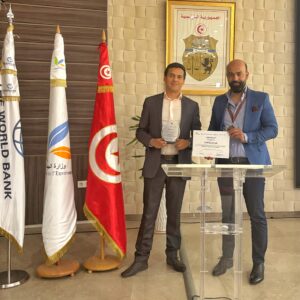
What Makes CHITELIX Different
CHITELIX’s approach goes far beyond recycling—it redefines how industries view waste. Traditional methods often treat crab shells as refuse or rely on processes that harm the environment. CHITELIX, on the other hand, applies a circular economy model, converting marine waste into renewable biomaterials that meet modern sustainability standards.
“We don’t just create products—we create solutions that help industries adapt to environmental and regulatory change,” Kais explains.
CHITELIX focuses on sectors where environmental challenges are most urgent:
-
Agriculture – a sector facing soil degradation, overuse of synthetic chemicals, and increasing pressure to reduce pesticide residues. CHITELIX’s chitosan-based solutions help farmers adopt more sustainable practices while protecting crop yields.
-
Water treatment – an industry struggling with pollution and heavy reliance on non-biodegradable, often toxic chemicals. Chitosan provides a natural, biodegradable alternative that enables cleaner and safer water treatment.
-
Biopackaging – at the core of the global plastic waste crisis. By developing biodegradable materials, CHITELIX supports industries in transitioning away from single-use plastics and complying with tightening environmental regulations.
These markets represent more than business opportunities—they address some of the most critical environmental challenges of our time. That is where CHITELIX aims to create the greatest impact.
Transforming Waste into Value
CHITELIX begins with materials once considered a burden—crab shells and other seafood by-products—and gives them a second life through a circular process. Instead of ending up in landfills or being discarded in the sea, these resources are transformed into high-value ingredients such as chitosan, calcium citrate, and organic fertilizers.
This approach not only reduces environmental pollution but also creates economic opportunities by providing industries with sustainable alternatives to petrochemical or synthetic inputs. In essence, what was once a waste management problem has become a driver of value creation across multiple sectors, contributing to both economic growth and a healthier environment.
Protecting Communities and Ecosystems
In Tunisia and across the Mediterranean, invasive blue crab waste has become a serious environmental concern—often discarded in landfills or directly into the sea, where it pollutes ecosystems and disrupts coastal communities. CHITELIX addresses this problem at its source by collecting and transforming the waste into valuable bioproducts rather than allowing it to accumulate as pollution.
The company’s circular model reduces marine and coastal waste, lowers greenhouse gas emissions linked to decomposition, and replaces polluting synthetic inputs with biodegradable alternatives. In this way, every ton of crab waste processed not only prevents environmental harm but also generates positive value for multiple industries.
By completing the value chain around the invasive blue crab, CHITELIX helps safeguard jobs for local fishermen who would otherwise struggle with market oversupply and disposal costs. What was once a burden has become a resource that sustains livelihoods. Through upcycling, the company prevents crab waste from being dumped along coastlines or in landfills, protecting both communities and the environment. Beyond that, its products contribute to healthier soils and more sustainable farming practices—ensuring that the benefits extend not only to today’s communities but also to future generations.
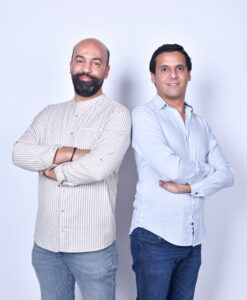
Looking to the Future
What excites the team at CHITELIX most is not only the technologies they are developing, but the scale of impact these innovations can achieve. Their focus remains on maximizing the positive outcomes of their work—reducing marine pollution, creating sustainable alternatives for multiple industries, and improving soil and water quality.
Every new project is guided by one central question: How big can the impact be, and how can it be maximized? Whether through advancing their biorefinery model, expanding into new markets, or collaborating with global partners, CHITELIX is driven by the potential to transform local waste challenges into global sustainability solutions.
Lessons in Leadership and Resilience
Building a business in an entirely new sector required vision and persistence.
“When you’re creating something that doesn’t exist yet, you have to imagine the unknown,” says Kais.
“You learn to trust the process, stay curious, and surround yourself with people who share your purpose.”
He approached this challenge alongside his co-founder with curiosity and determination, surrounding himself with a strong, mission-driven team and seeking guidance from mentors, partners, and institutions who shared their belief in the project.
Through teamwork, mentorship, and collaboration, Kais turned uncertainty into opportunity—a defining quality of leadership in the sustainability space.
Advice for the Next Generation of Sustainable Entrepreneurs
Kais’s advice to aspiring entrepreneurs is simple yet profound:
“Sustainability isn’t a cost—it’s a source of value. Profit and purpose can absolutely coexist if you stay resilient, patient, and committed to real-world impact.”
He believes that building a business that respects both people and the planet can indeed be profitable—but it requires patience, resilience, and a clear long-term vision.
He advises entrepreneurs to stay true to their mission while remaining pragmatic—listening to the market, understanding regulatory trends, and designing solutions that address real needs. Most importantly, he highlights the importance of surrounding oneself with people who share the same values, as impact-driven entrepreneurship is a journey that demands both conviction and collaboration.
“Above all,” he concludes, “build your journey with people who share your values. True sustainability is always a collective effort.”
CHITELIX Transforming Marine Waste into Sustainable Value through Circular Bioinnovation


